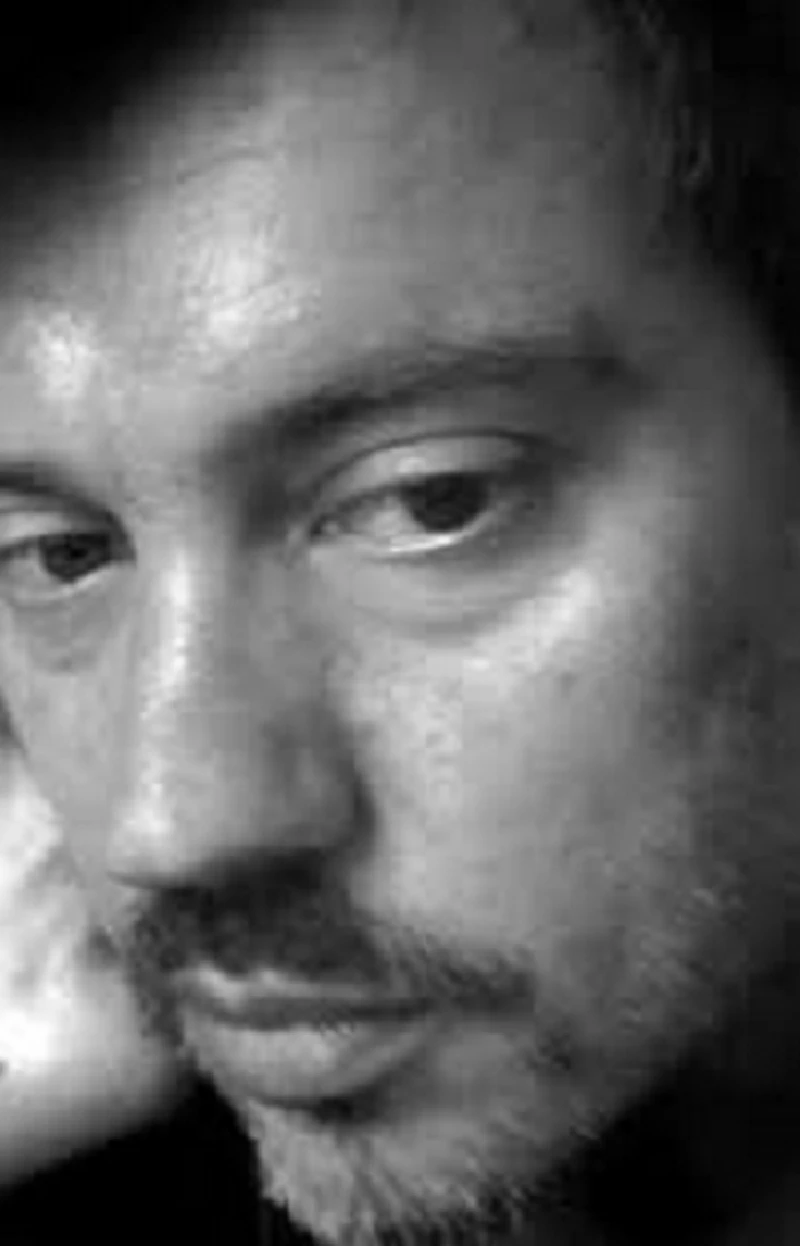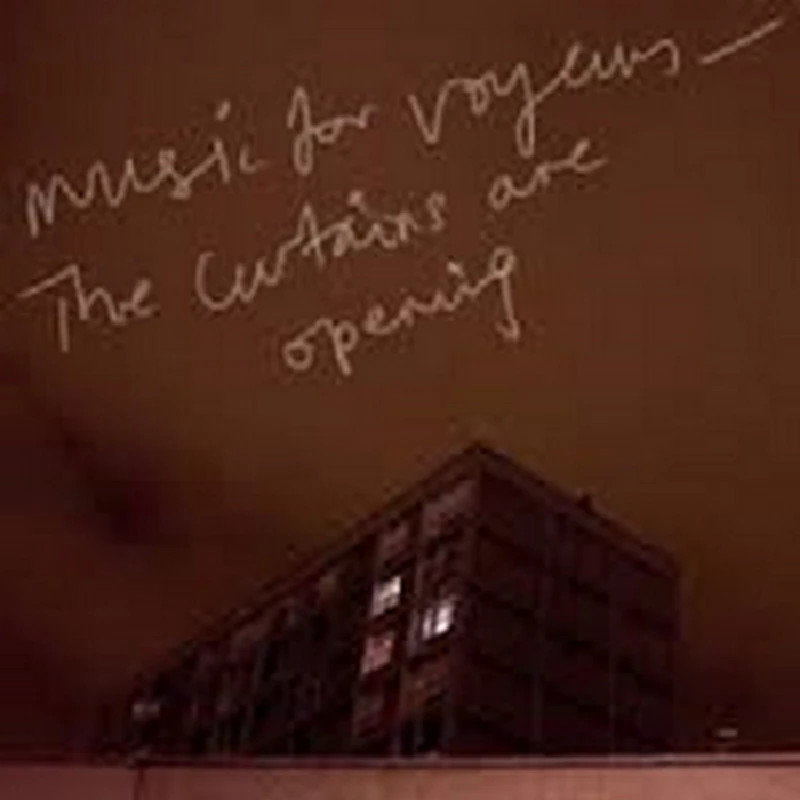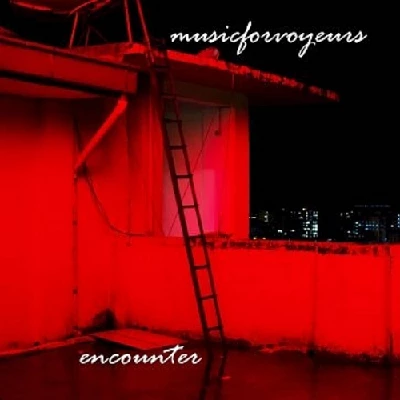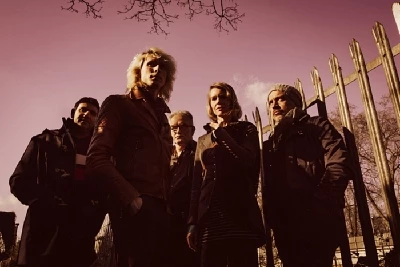musicforvoyeurs - Interview
by John Clarkson
published: 9 / 8 / 2014

intro
John Clarkson talks to London-based musician and photographer Rick Senley about his brooding guitar/electronic project musicforvoyeurs, and its third album, 'The Curtains Are Opening'
You won’t read about musicforvoyeurs on Facebook or for that matter on Twitter. As Rick Senley explains in this interview, he has a hatred of both of them and of social media in general. Through their own website www.musicforvoyeurs.co.uk and also word of mouth on independent websites of this kind, Senley and musicforvoyeurs have, however, over the last few years gained a small but intense following. A guitar/electronic project, musicforvoyeurs was born out of tragedy, and, as Senley says on its web pages “began on morphine and crutches.” After the death of his girlfriend, Senley, who is from London, wound up in hospital himself. As he learnt to walk again, he taught himself piano, keyboards and trumpet, each of which he borrowed from his flatmate, and started playing the guitar again for the first time in almost a decade, since the collapse after an on-stage row of his previous band, the hedonistic Gent. An eponymous first album was recorded, as he suffered both insomnia and depression, largely in the early hours of the morning. It set a blueprint for much of what was to follow, merging his melancholic music with field tapes and recordings from the odd, obscure-channel TV shows that Senley would have on in the background as, unable to sleep, he worked through the night on his music. ‘musicforvoyeurs’ was described by one critic as “delicate and mournful,” and another as “loneliness and despair evocatively brought to life.” Its second album, ‘The Long Sleep’, was bleaker still. By now Senley had suffered a psychiatric breakdown, and, with its hazy ambience and gloomy tranquility, 'The Long Sleep' had a numbed-out sound that came alongside the heavy opiates he was being treated with at the time. The project’s third album, ‘The Curtains Are Opening’, came out in June, and finds Senley’s fortunes at last starting to change. The opening track, ‘I’ve Given Up on Everything’, ironically opens with the dreamy optimistic glow of softly shimmering keyboards, before a brash, abrasive guitar thrusts its way into the mix. ‘Save Me’,which comes next, merges a wailing trumpet, the sound of a telephone ringing and mournful stabs of piano with the wild chatter of a tele-evangelical preacher. Later on, there is ‘Winter is Coming to An End’, which is a near classical piano piece. ’55 and from Wales’ meanwhile combines a brooding keyboard line with the voice messages of approximately twenty people of all ages, some hetrosexual, some gay, some looking for romance and others sex, all leaving tapes on a TV dating programme. The album is closed with ‘Screech’, which features a sample recorded on a Boston tour bus and concludes in a blast of wailing guitar noise. ‘The Curtains Are Opening’, without offering any false promises of hope, is about someone, after a long absence from the world, starting to take his first tentative steps back within it. Rick Senley is also a professional photographer and has published several books of photography, including most recently ‘Fighting for Something’, about unlicensed boxers. Pennyblackmusic spoke to him in Burma where he had been working and travelling for the last few months. In this rare interview, he revealed himself to be bluntly self-observant and honest, and also thought-provoking. PB: musicforvoyeurs was born out of exceptionally tragic and harrowing circumstances and, while you were learning to walk again, you taught yourself the piano and trumpet and started playing the guitar again to get yourself through a bleak London winter. How long ago was this? RS: All this happened in the winter of 2006/7, not a particularly pleasant time. I went down the usual routes of excess, trying not to deal with the painful emotions I was going through and although the music certainly didn’t stop that – the excess and the pain – I found it a helpful (and healthier) way of getting myself through it. I’d already been living in the flat (where most of the albums were subsequently recorded) for a year when I suddenly realised that it was actually a ready-made studio. My flatmate had a grand piano, trumpet, keyboards and recording software, so all I had to do was learn how to play it all and work the computer. PB: You had previously been the guitarist in the London-based Gent. Their gigs were apparently booze-ridden affairs, which saw you thrown out of various venues. Who were they and what happened to them? How long had they been split up when you started musicforvoyeurs? RS: Gent were me (guitar, gig booker, drunk), Stuart (singer/songwriter who sounded like a cross between Robert Smith and Julian Cope), Jim (bassist/songwriter, slapper in the face of me after one ruined gig), Rich (keyboards and disapproving of me) and Luke (drums and relatively tolerant of me). It was fun. I ordered booze on stage between and during songs. I got thrown out of a few of our gigs and accidentally short-circuited one place for spilling my drinks on some wires – stupid place to leave them. We had record company interest at our final gig but unfortunately Stuart’s trousers came off and I was playing three songs behind the rest of the band. Jim slapped me in the face and I never saw them again, nor touched a guitar until my accident. A year later a friend found Stuart laying eggs from his bottom in Soho. I met up with him recently – the first time since we split up 15 years ago. He was starkers before the end of the evening. Oh, those were the days. PB: The first two musicforvoyeurs albums, 'Musicforvoyeurs' and 'The Long Sleep', were both dark albums. 'The Curtains Are Opening' , as the title implies, suggests a change of fortunes, a glimpse at least of something better. There are still moments of melancholy on the album, but tracks such as 'Winter is Coming (to an End)' and 'Screech' musically (as well as in their titles) seem to have more of a sense of optimism about them. Do you see this album as acknowledging depression but also capturing the better days as they come? RS: Yes, they were both dark; melancholic and introspective. Between the first and second albums, I then seem to have gone round the bend. I had a funny turn; lots of emotions I had been trying and hoping to ignore, suppress and repress came back and ,after a few more emotionally demanding episodes, I was hit with depression. It was a shock. It just came out of the blue, although had I been more psychologically attuned to my mental state, I would have been more aware of the signs. At first I had no idea what the bloody hell was happening – at one point I was almost catatonic. I could barely move or get any words out and that’s where ‘The Long Sleep’ came from. So, yes, ‘The Curtains are Opening’ is from the other side. Once I understood more of my situation, after the medication started and the therapy and studying of the mind helped me address unwelcome thoughts, I felt more, as you put it, ‘optimistic’ about things, but as anyone who listens to it will realise, it’s still hardly Bananarama. PB: 'Save Me' combines discordant music with a sample of an evangelical preacher. The preacher says that God "will get you out of this", but will put you in a "tight place" first. Where was that sample taken from? What was the appeal to you of writing a piece of music around that sample? RS: The preacher samples came from an oddly captivating American religious television channel I found in the middle of the night, full of wonderfully loud and demanding zealots. They can be frightening when you’re sitting on your own in the dark at three in the morning. The undiminishing enthusiasm of these imposing voices has something undeniably powerful and attractive about them. The boom makes you stop and listen and I found the words quite prophetic – whether it’s God, yourself, a tablet or bottle of vodka that will get you out of the tight place. I wanted to use some trumpet too, to give it a noirish, seedy, American feel. PB: ‘55 and From Wales' features the voices of several different people leaving phone dating messages. There is a real sadness about that track, capturing briefly the lives of all these people who are for whatever reason single, yet at the same time there is a real optimism there as they are all looking for something better. Where did those samples come from? RS: That’s one of the songs that I’m happy to admit manages to bring out powerful emotions in me. I’m naturally uncomfortable talking about my reaction to my own songs – it feels conceited and vulgar, incestuous and un-English although I would be lying if I said hearing some of my music doesn’t have a visceral effect on me. Most people’s lives are spent looking for someone to complete them and it can become an all-consuming obsession, and at half four in the morning on a barely watched television dating channel it feels so much rawer. I find that desperate neediness both immensely touching and depressing. Technology has allowed or encouraged our desires and fears to be a constant presence to the outside world, with never-ending outlets for the most poignant and private parts of our lives. I recorded hours’ worth and chose the chat-up lines I felt were the most ridiculously obscure, sad or unsettling, with the sound of barely held back tears. I’ll probably put on an Irish accent when I go on there myself. PB: As well as musicforvoyeurs, you also have another musical project, I Am A Man With A St Tropez Tan. I Am A Man With A St Tropez Tan, like musicforvoyeurs have also recorded three albums and combine guitar and keyboard/piano music with samples yet has more of an industrial/techno sound. Do you write separately for both musicforvoyeurs and I Am A Man With A St Tropez Tan or do you decide after you have written something which project you are going to use it for? How much of both musicforvoyeurs and I Am A Man With A St Tropez Tan’s music comes from improvisation and how much from advance planning? RS: I usually write separately for each project – piano or acoustic guitar to start off with for musicforvoyeurs, keyboards, samples, a beat, effects pedal, loop or just a sound for I Am A Man With A St Tropez Tan and then I see what happens. I have the premise for the structure of a few songs, particularly those with lyrics and a lot of musicforvoyeurs is written when I’m alone – I need that mental and physical space, whereas being more experimental with I Am A Man With A St Tropez Tan, I can allow myself to be more open. If the headphones are loud enough when I’m recording, it doesn’t matter if people are in the room or if there’s background noise. In fact, the presence of other people and sounds usually helps. As does drinking and being hungover. PB: You seem with musicforvoyeurs and I Am A Man With A St Tropez Tan to have almost totally avoided current methods for promoting both projects. There is little on Bandcamp about either act. You don't have Facebook pages. There is nothing on Amazon, and you seem to rely largely on independent sites for publicity. Why have you decided to go down this course? RS: I hate Facebook, I hate Twitter, I hate social media. I don’t understand Facebook, I don’t understand Twitter, I don’t understand social media. I’m afraid of Facebook, I’m afraid of Twitter, I’m afraid of social media. I’m also so out of touch with it all, that I feel it’s all passed me by and it’s so overwhelming, I wouldn’t know where to start. I know I should give myself some social media presence (is that the right phrase?) but I’m hostilely resistant to this aspect of modern existence. Similarly, I’ve never celebrated my birthday; if any friends turned up, I would assume they’d only come to my party out of pity or obligation and I would resent them. If they didn’t bother coming, then I’d think they were shits. It’s the same (in my logic) with Facebook. If I started telling people what I’ve just had for tea and everybody ignored me, then I would be very upset. I would also like friends to promote my music on their pages but wouldn’t want to ask them in case they said no or didn’t actually do it. Do I ask them again? Confront them, beg them? I’ve fallen out with friends for not doing what they’ve offered to do; I hate asking people for anything and the subsequent nagging feeling of indebtedness so I don’t want to risk any more friendships. I did have a Facebook lesson recently and the teacher helped me set up a page but I didn’t have a clue what was going on so I’ve long since given up. There’s also a further element of self-protection involved. If I had an extensive social media presence and somehow didn’t end up headlining Wembley and having girls’ knickers bunged at me, then I’d obviously be a failure. This way, because I’m rarely mobbed by teenage girls at Tesco’s, I can blame not being on Facebook and my perpetual sense of unfulfillment will prompt me to write another miserable album. PB: When you are not writing music, you are a much in demand travel and photo journalist and are currently as we speak in Burma working over there. Now that you are in better health, how easy is it writing for you music and combining this with the demands of your regular job? RS: Do you mean in better health mentally or physically? Mentally, it’s only fragile and physically, I’m covered in bites, but being abroad helps with the music. Although I haven’t got any way of writing music when I’m out of London (of course I haven’t got an I-pad/pod or anything useful like that), I’m constantly picking up sounds and ideas and the occasional instrument. I recently spent several months in Thailand so a lot of the next album has an Eastern feel – the noises in the street, the temples, the people, the animals. I work freelance in London and do a lot of night shifts at a newspaper so I get plenty of time for my music. However, I’m far from being in demand, so I’m assuming you’ve got the wrong person. PB: You have now published several books of photos, including your latest 'Fighting For Something' which is about unlicensed boxing. Why did you decide to produce a book on such a savage sport? You are also currently working on two novels. What are those about? RS: The boxing project originally started in Spain. I was living on the Costa del Sol, trying to write a book about British ex-pats and its criminal underworld. There was a well-known villain I needed to speak to so a meeting was set up at an unlicensed boxing do in south London. Surprisingly (or not – my childhood hero was Rocky) I enjoyed it, met some interesting people and started going regularly. A promoter asked me to take pictures for him, so I ended up going to shows all over the country and getting to know a lot of the fighters. On a more subconscious level, I admire and envy the courage of boxers; their focus, discipline, determination, and like Rocky, I’d always regarded myself as an underdog in every aspect of my life; I’ve never felt good enough or that I belong anywhere or to anything – that sense of isolation and loneliness drives a lot of my music. So apart from actually fighting, I felt a sense of affinity and connection with these tough and driven men, people often on the fringes of society. In a similar way to the repressed feelings that led to my going funny, these boxers had not, on the whole, sought to analyse a lot of the emotions that drove them to fight in the first place and interviewing them gave them that chance for self-reflection which seemed to give them an immense sense of relief. After I wrote the book, I trained at a boxing gym for a year to see what I could learn myself. In hindsight I could have saved the five pound session fee – I’d always known I was an out of shape coward. The novels – one is about a 19th century sex addict, and the other is about a naive Englishman stuck in monsoon-ravaged Bangkok who discovers some long dormant talents with a ping pong bat. PB: 'The Curtains Are Opening' closes with 'Screech', which concludes with a rush of near euphoria and guitar noise. There is a sample on there in which an announcer describes the place where John F. Kennedy proposed to Jackie. Where did you get that from and why did you decide to use that? With 'Screech' as your last track, what direction do you see the next musicforvoyeurs album going? RS: I was on a very touristy bus tour of Boston (for whatever skewed principle, I am always firmly against them, but I only had a few hours in town) and, as according to the guide/announcer, we were passing the hotel where he supposedly proposed, I got carried away with his childlike enthusiasm which sounded slightly less contrived than other Americans’. I thought his mild insincerity would sound nice with some needlessly unpleasant guitar on top. The next album is going to be a medley of Beatles covers. Actually, it won’t – I hate the Beatles and distrust anyone who likes them “because they’re The Beatles.” As I mentioned, some of the new songs have got Oriental elements and others were originally recorded (and not used) for a short film called 'Encounter' about a tramp, a missing cat and some empty bottles of wine. PB: Thank you.
Band Links:-
https://www.facebook.com/musicforvoyeurs/http://musicforvoyeurs.co.uk/
Picture Gallery:-

soundcloud
reviews |
|
Encounter (2017) |

|
| Melancholic but thought-provoking fourth album from musicforvoyeurs, one of the many projects of London-based musician Rick Senley |
most viewed articles
current edition
Peter Doherty - Blackheath Halls, Blackheath and Palace Halls, Watford, 18/3/2025 and 21/3/2025Armory Show - Interview with Richard Jobson
Liz Mitchell - Interview
Deb Googe and Cara Tivey - Interview
Lauren Mayberry - Photoscapes
Max Bianco and the BlueHearts - Troubadour, London, 29/3/2025
Garfunkel and Garfunkel Jr. - Interview
Maarten Schiethart - Vinyl Stories
Clive Langer - Interview
Sukie Smith - Interview
previous editions
Heavenly - P.U.N.K. Girl EPBoomtown Rats - Ten Songs That Made Me Love....
Trudie Myerscough-Harris - Interview
Doris Brendel - Interview
Beautiful South - Ten Songs That Made Me Love...
Pulp - Ten Songs That Made Me Love...
Dwina Gibb - Interview
Kay Russell - Interview with Kay Russell
Barrie Barlow - Interview
Sound - Interview with Bi Marshall Part 1
most viewed reviews
current edition
Davey Woodward - Mumbo in the JumboNigel Stonier - Wolf Notes
Wings - Venus and Mars
Kate Daisy Grant and Nick Pynn - Songs For The Trees
Only Child - Holy Ghosts
Neil Campbell - The Turnaround
Philip Jeays - Victoria
Darkness - Dreams On Toast
Suzanne Vega - Flying With Angels
Charles Ellsworth - Cosmic Cannon Fodder
related articles |
|
Made in Minsk: Interview (2019 |

|
| John Clarkson speaks to the guitarists Rick Senley and Haris Shah in London-based multinational alternative rock band Made in Minsk about their debut single, 'Where the Truth Lies'. |
Pennyblackmusic Regular Contributors
Adrian Janes
Amanda J. Window
Andrew Twambley
Anthony Dhanendran
Benjamin Howarth
Cila Warncke
Daniel Cressey
Darren Aston
Dastardly
Dave Goodwin
Denzil Watson
Dominic B. Simpson
Eoghan Lyng
Fiona Hutchings
Harry Sherriff
Helen Tipping
Jamie Rowland
John Clarkson
Julie Cruickshank
Kimberly Bright
Lisa Torem
Maarten Schiethart